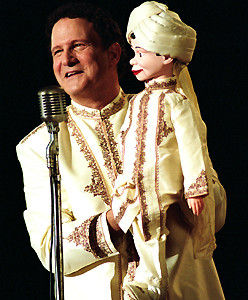Cinema Revisited: Looking For Comedy in the Muslim World (2005)
- James L. Neibaur
- Aug 10, 2019
- 3 min read

Produced, written, directed by, and starring Albert Brooks. Also featuring Sheetal Sheth, John Carroll Lynch, John Tenney, Homie Doroodian. Released January 20, 2006. Running time: 98 minutes.
Albert Brooks is noted for such fun comedies as "Modern Problems," "Mother," "Lost in America," and "Defending Your Life." However, despite it not being a box office success in its time, "Looking for Comedy in the Muslim World" is probably his funniest, most insightful, and best directed comedy. Brooks plays himself, the comedian, who is summoned by President George W. Bush in the post-9/11 climate, and dispatched to India and Pakistan to find out what kind of humor the Muslims react to. What Brooks realizes is that comedy doesn't always translate comfortably between cultures, while the 500 page dissertation he is asked to submit is especially daunting.
Brooks travels through the area, randomly stopping people and asking what makes them laugh. He finds out such things as "polish jokes work everywhere," and that The 3 Stooges are noted in this culture with Larry being a particular favorite. He arranges to rent a hall and put on his own act to see how the audience might respond to his jokes. Brooks does some of the highlights of his long time standup, including the hilarious ventriloquist act with "Danny," and the bit where the audience offers suggestions as to the structure of an impending improve, and Albert accepts, then changes all of their ideas as he goes. It is met with stony silence from a confused audience.
Albert Brooks' standup act was far different from the established form, as he'd play an earnest comic who did everything wrong, and therein lies the humor. As a director, he avoids quick edits, cross-cutting to reactions, and wild slapstick punctuation to instead linger on his characters and settle on his shots, including some impressively effective establishing shots that take advantage of the location. But his films fail to resonate at the level they deserve. The fact that this film ended up being his least successful makes this especially noteworthy.

As for its narrative structure, the film also explores just how this post 9/11 culture might respond themselves to his attempts to research humor in the area, suspiciously contacting the American embassy.
Circumstances result in his getting to Pakistan and entertaining a much more enthusiastic audience in the middle of the night near the border, which he must cross illegally. However, when he huddles with a small group of aspiring comedians who speak no English and need every line translated, they roar with laughter at every joke. Word of his visit reaches the Al Jazeera network, which he hopes will give him the publicity to help complete his study, but he discovers they want him to start in a new sitcom concept entitled "That Darn Jew."
There is an auteurist approach to the material in that Brooks produced, wrote, directed, and starred in the film. This allows his creative methods to continue unfettered, and extend even into such amusing tangents as Brooks taking umbrage at being asked about other comedians, claiming it is a showbiz secret that comedians only want to talk about themselves.

Brooks has never been given his proper due as a film director. His formalistic approach is steeped in realism, avoiding a lot of the functional clichés of comedy directing; holding longer shots and using fewer cuts. This style helps pace the movie at the same speed as the central figure's cynicism. The location shooting is a good backdrop for Brooks' wide shots that encompass a lot of negative space, all of it active with movement.
And the film's narrative setup is perfect. Penny Marshall auditions Brooks for a role in her planned upcoming remake of "Harvey" in the iconic Jimmy Stewart role. Marshall rejects Brooks while at the same time muttering how ridiculous it was for him to have co-starred in a remake of "The In-Laws" -- the ultimate Brooks irony.
Often Brooks' movies have been accused of not ending well, not coming to a satisfying conclusion. In fact, they even make a joking reference to that in this movie. But "Looking For Comedy in the Muslim World" ends effectively, capping the proceedings with no loose ends.
"Looking For Comedy in the Muslim World" played few theaters upon its initial release and made less than a million dollars against its ten million dollar budget. It was a resounding financial failure. But, for all intents and purposes, it might live on as, cinematically, his best film.
Comments